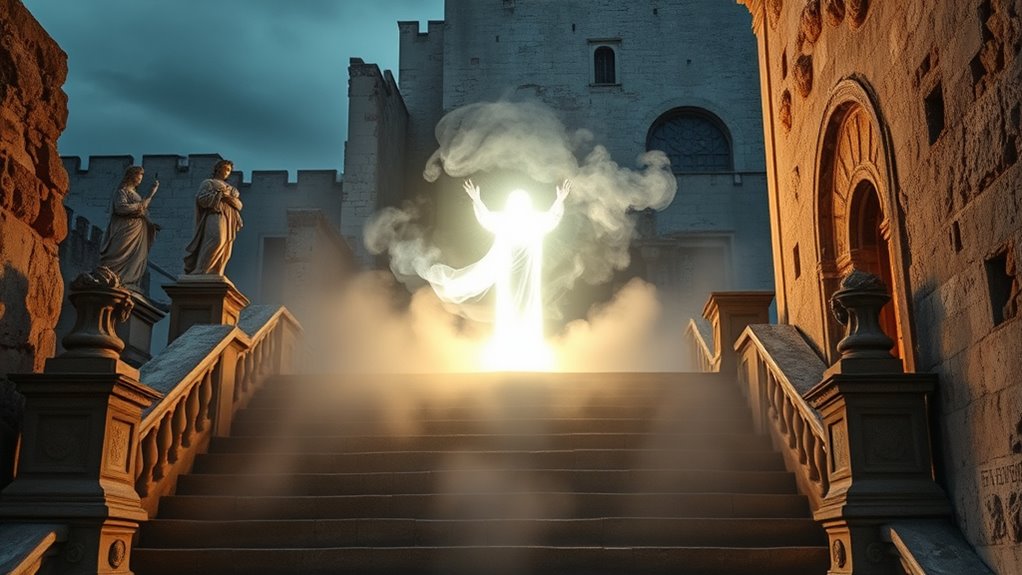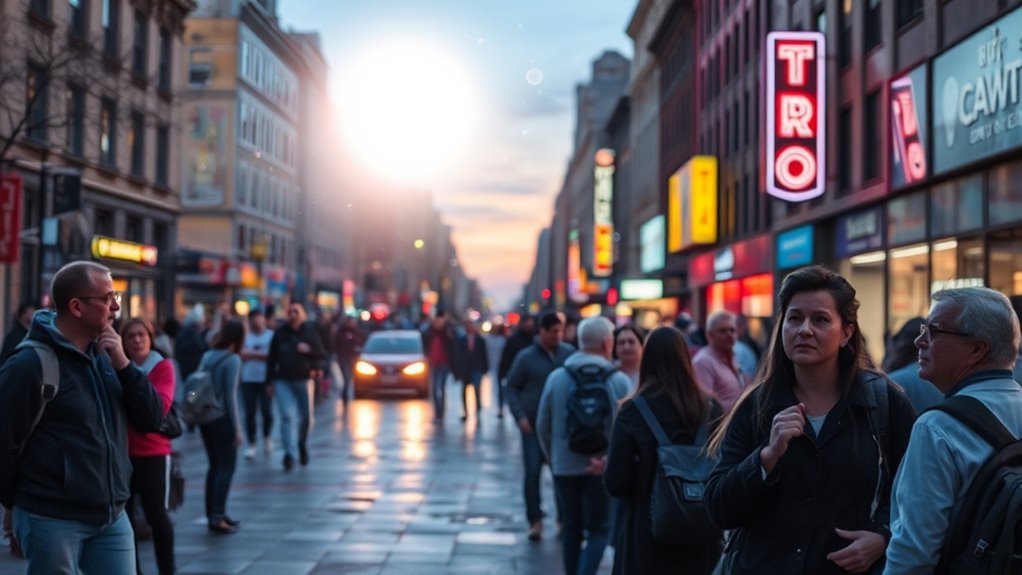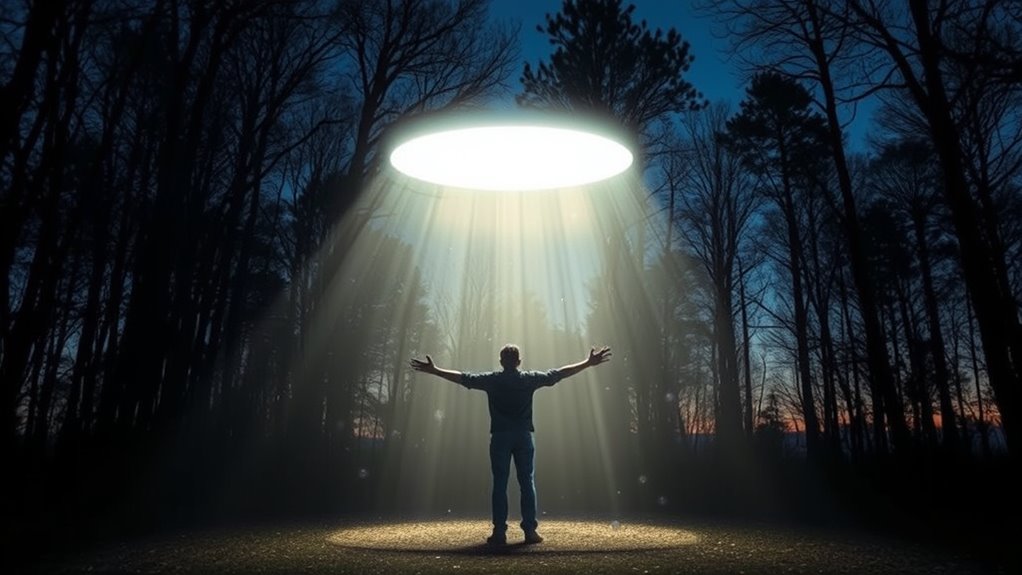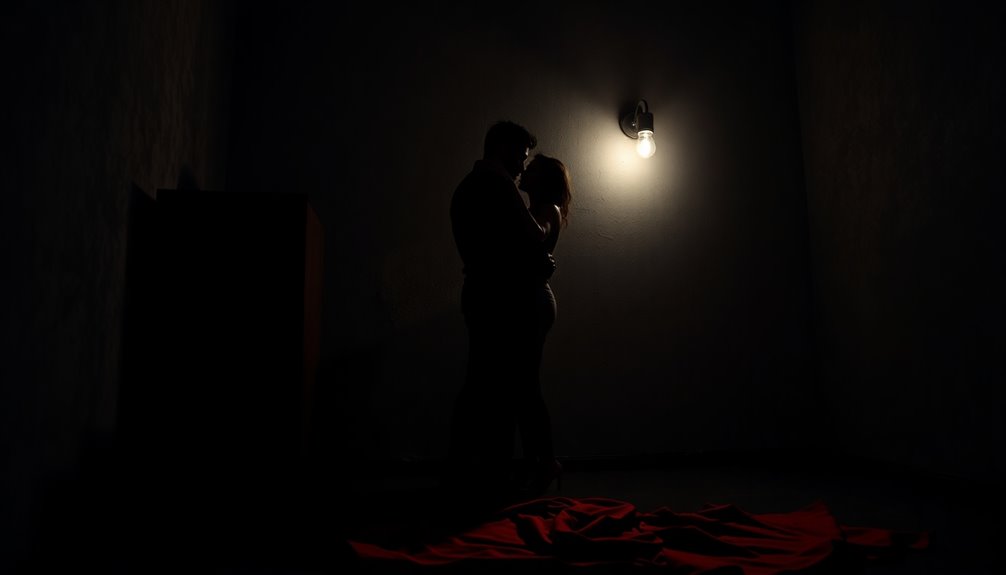Miracles have been recorded throughout history, often tied to faith and cultural beliefs, but scientific explanations suggest many could be natural or psychological events. While some people share vivid testimonies of supernatural encounters, skepticism remains, emphasizing natural causes or coincidences. As science advances, we’re uncovering neural and psychological factors behind these experiences. If you want to explore how faith, culture, and science intersect when it comes to miracles, there’s much more to uncover ahead.
Key Takeaways
- Cultural stories and personal testimonies provide ongoing evidence of miraculous events, but remain subjective and interpretive.
- Scientific research seeks natural or psychological explanations for supernatural claims, aiming to validate or refute miracles.
- Advances in neuroscience and psychology help understand perception and mystical experiences, bridging science and spirituality.
- Skepticism emphasizes natural causes, fraud, or cognitive biases, challenging the authenticity of many claimed miracles.
- Future interdisciplinary research may deepen understanding, blending empirical evidence with spiritual perspectives on the supernatural.
Historical Accounts of Miraculous Events

Throughout history, many cultures have documented events they consider miraculous, often attributing them to divine intervention or supernatural forces. Ancient legends and cultural myths serve as rich records of these extraordinary occurrences. In these stories, heroes often survive impossible odds, healings happen instantly, and celestial signs appear during critical moments. These accounts are passed down through generations, shaping beliefs and traditions. While some see them as mere stories, others view them as evidence of supernatural power. These stories often reflect cultural values and spiritual perspectives, highlighting their importance in shaping community identity. Additionally, the visual and auditory cues present in these accounts can emphasize their perceived miraculous nature. Such narratives are frequently supported by historical documentation, which can help validate their significance in certain contexts. Whether viewed as literal events or symbolic narratives, these stories of miraculous happenings remain a significant part of human history and cultural identity.
Scientific Explanations and Skepticism

Have you ever wondered if miraculous events can be explained through science? Skeptics argue that many so-called miracles have natural or psychological explanations. In paranormal investigations, scientists look for evidence that can be tested and verified. Here are common scientific explanations skeptics propose:
- Psychological factors: Human perception and suggestibility can distort experiences, leading individuals to interpret ambiguous stimuli as supernatural phenomena. Perceptual biases can play a significant role in how events are perceived. Additionally, cognitive biases may influence the interpretation of ambiguous evidence. Recognizing how perception influences interpretations is crucial for evaluating extraordinary claims objectively.
- Environmental influences: Natural phenomena or coincidences are mistaken for supernatural acts, especially when contextual factors are overlooked.
- Fraud and misinterpretation: Some claims are intentionally fabricated or misunderstood, often to gain attention or financial gain.
- Confirmation bias: People tend to remember only the events that support their beliefs, ignoring evidence that contradicts them.
- Cybersecurity vulnerabilities: During incidents like the Microsoft outage, security flaws and cyberattacks can obscure the line between natural failures and malicious interference, complicating investigations.
- Scientific skepticism: The scientific community emphasizes testability and evidence, which limits the acceptance of claims that cannot be empirically verified. Furthermore, the importance of peer review ensures claims are critically examined before acceptance. Additionally, the rise of AI technologies has highlighted the importance of monitoring for vulnerabilities that could be exploited to generate false or misleading information, further complicating the validation process.
Modern Encounters and Testimonies

Many people today report personal encounters they interpret as miraculous, often sharing vivid testimonies of unexplained events. These stories form part of miracle documentation that captures their experiences, fueling ongoing debates about the supernatural. While some testimonies are compelling, others raise questions about testimony credibility, especially when accounts vary widely. You might find that these encounters are documented through videos, written accounts, or recordings, adding to their perceived authenticity. Despite skepticism, many individuals firmly believe their experiences are proof of divine intervention or supernatural forces. These modern testimonies keep the discussion alive, illustrating how personal encounters continue to shape perceptions of miracles in today’s world. As you explore these stories, consider both the emotional impact and the challenges involved in verifying such extraordinary claims. Additionally, examining religious and spiritual perspectives can provide deeper insight into why these experiences resonate with so many people. Moreover, understanding the role of testimony credibility is crucial in assessing the validity of these encounters, as it influences how they are perceived and accepted by wider audiences. Authenticity verification methods are increasingly being used to evaluate these accounts, which can help distinguish genuine experiences from potential misunderstandings or fabrications. Recognizing the emotional significance of these stories also plays a key role in how they are shared and interpreted. Furthermore, the influence of cultural context can deeply affect how such miracles are perceived and valued across different communities.
The Role of Faith and Belief Systems

Faith and belief systems often shape how you interpret and respond to miraculous events. Your faith perception influences whether you see an event as divine or coincidental. Belief influence guides your emotional and cognitive reactions, reinforcing your worldview. To understand this better:
- Your faith perception filters experiences through spiritual or skeptical lenses.
- Belief influence affects how open you are to accepting miraculous explanations.
- Cultural background shapes your understanding of what constitutes a miracle.
- Personal history can strengthen or weaken your belief influence in supernatural occurrences.
- The types of planters and pots you choose may reflect underlying beliefs about nurturing and growth, illustrating how material choices can mirror spiritual values. Additionally, WWE Raw’s financial impact demonstrates how large-scale entertainment events can influence cultural perceptions and beliefs about success and spectacle. Recognizing the water-based techniques used in hydrotherapy highlights how water’s healing properties influence perceptions of wellness and miracles. These factors determine whether you interpret an event as a genuine miracle or a natural phenomenon. Your faith perception and belief influence are central to how you perceive the supernatural, impacting your overall worldview and responses.
Future Perspectives on the Supernatural

As scientific advancements continue to expand our understanding of the universe, perspectives on the supernatural are likely to evolve considerably. You may find that paranormal phenomena once dismissed as mere superstition could be reinterpreted through new scientific frameworks, sparking fresh debates. As research explores consciousness and spiritual evolution, you might see a shift toward integrating spiritual experiences with empirical evidence. This ongoing exploration may also benefit from developing scientific methodologies that rigorously examine supernatural claims, leading to more grounded interpretations. Moreover, interdisciplinary collaborations between scientists and spiritual scholars could foster novel insights into supernatural phenomena, bridging the gap between belief and empirical study. This could lead to a broader acceptance of supernatural claims, not as miracles alone, but as part of an ongoing human quest for understanding. Additionally, ongoing research in peer-reviewed studies will help ensure that interpretations of supernatural claims are grounded in scientific rigor. You may also observe how advancements in neuroscience and psychology contribute to understanding perception and experiences related to the supernatural, providing empirical context. Furthermore, emerging technologies such as brain imaging could offer new ways to investigate mystical and paranormal experiences, deepening our understanding of their neural correlates. Ultimately, future perspectives may blend scientific inquiry with spiritual insight, transforming how you perceive the supernatural in everyday life.
Frequently Asked Questions
Can Miracles Be Scientifically Proven Beyond Anecdotal Evidence?
When you ask if miracles can be scientifically proven beyond anecdotal evidence, it’s a tough question. Scientific methods rely on empirical data, but faith healing and paranormal investigations often lack consistent, reproducible results needed for proof. While some claim extraordinary events as miracles, you must consider skepticism and the limits of current science. Ultimately, without verifiable, objective proof, miracles remain outside the domain of scientific validation.
How Do Different Cultures Interpret Miraculous Events Differently?
Did you know that around 75% of cultures worldwide interpret miraculous events through their unique cultural narratives? You see, these stories shape how people perceive and interpret the supernatural, often assigning ritual significance to such events. Different cultures view miracles through diverse lenses—some see them as divine signs, others as spiritual tests. Understanding these interpretations reveals how deeply cultural contexts influence beliefs about the supernatural and the meaning behind miraculous occurrences.
Are There Any Documented Cases of Verified Supernatural Phenomena?
You might wonder if verified supernatural phenomena exist. Many documented cases, like faith healing and divine intervention, have been investigated, but scientific proof remains elusive. Some individuals report genuine experiences, but skeptics often attribute these events to psychological or natural causes. While personal testimonies are compelling, objective verification is rare. So, whether these events are supernatural or not depends largely on your perspective and belief in the extraordinary.
What Psychological Factors Influence Belief in Miracles Today?
They say, “Seeing is believing,” but your belief in miracles is often shaped by psychological factors. Cognitive biases, like confirmation bias, make you favor evidence that supports your faith, while emotional influence heightens your perception of supernatural events. These forces can lead you to interpret coincidences as extraordinary, reinforcing your belief in miracles regardless of scientific explanation. Understanding these factors helps you see how your mind shapes supernatural perceptions.
Could Advancements in Science Eventually Explain All Supernatural Occurrences?
You wonder if science will someday explain all supernatural events. As quantum mechanics and consciousness studies advance, they might reveal how seemingly miraculous occurrences fit within natural laws. You should stay curious, as these fields explore the universe’s mysteries, potentially demystifying miracles. While some believe science will eventually provide answers, others think certain phenomena may always transcend current understanding, leaving room for the supernatural to coexist with scientific progress.
Conclusion
So, while history teems with miraculous stories and skeptics demand scientific proof, maybe the real miracle is how we choose to believe. Whether you see miracles as divine interventions or psychological wonders, one thing’s certain: the mystery keeps us searching. Ironically, in a world obsessed with facts, it’s our faith and wonder that truly fuel the magic. Perhaps, the miracle lies not in the event, but in our willingness to believe.










